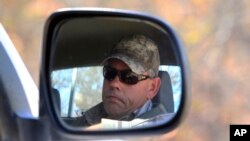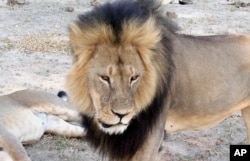Since his death at the hands of an American hunter last month, Cecil the lion has been, well, lionized in online forums and the international media. Cecil was both a research animal and a tourist attraction; animal rights activists have championed drives to have his killer, Walter Palmer, sent back to Zimbabwe to face undetermined charges.
In Zimbabwe, where lions are often seen as a menace or a simple fact of life, the reaction has been much more muted. Most locals who VOA spoke to in wildlife-rich Hwange, the area where Cecil was killed, said the media and activists have gone into overdrive.
One woman in her late 30s, who asked to be identified only as “Zah," fearful of antagonizing Zimbabwean authorities who have called for Palmer's extradition, said her father had lost more than 10 cattle to lions over the years, giving her a much less sympathetic view toward the majestic creatures.
"I think what might grieve us as a community is to hear how much this lion was worth [to foreign hunters] .... but we do not benefit anything from having them here," she said.
Across the river lives Lorra Sibanda, who is puzzled about why the lion should be considered special. "I think it is rubbish, because most Zimbabweans do not know about Cecil," she said. "So I do not see the fuss about Cecil."
Another woman, who also refused to be identified, said attention should be focused on Zimbabweans who struggle to find jobs and adequate food, not animals.
“It got a lot of publicity," she said. "But what about the hundreds and thousands of people in need and starving?"
At least one person, Rob Jobson, an Australian tourist visiting Hwange, said he considered Cecil's death a big deal.
"Quite apart of it being a disgraceful act, of conservation vandalism, I also believe that it is against the laws of this country," he said. "I would want to see the authorities deal with all concerned according to law as they deserve."
Palmer has gone into hiding in the U.S., as activists demand that he face charges for Cecil's death. As of Friday, more than 230,000 people had signed a petition calling on the Obama administration to extradite Palmer.
The outrage appears to have spurred Delta Air Lines, American Airlines and United Airlines to announce this week that they will not longer carry lion, leopard, elephant, rhino and buffalo trophies.
Some African countries are criticizing the decision. South Africa's environment ministry said Delta's "blanket ban'' does not distinguish between the legal and illegal wildlife trades.
Namibia warned that the airline ban on trophy transportation will hurt its economy and conservation efforts that rely on revenue from hunters.





